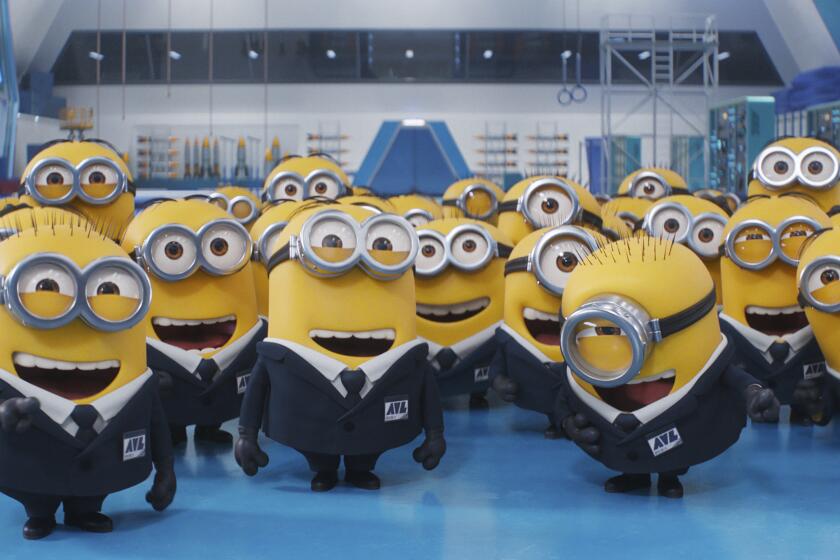For Toshiba, Laptops Were Key to Future : Computers: Since introducing its first portable, the Japanese electronics giant has become a dominant player in the market.
Several years back, Toshiba Corp. executive Kiichi Hataya was asked to plot a strategy for the Japanese electronics giant’s entry into the U.S. market for mid-range business computers.
After spending $2 million--ostensibly to draw up a marketing plan--Hataya was ready to report back to his bosses in Tokyo. But he had a surprise in store for them.
Rather than describing a plan for attacking the American market, Hataya told them that selling mid-size computers, known as minicomputers, was a bad idea.
A better plan, he suggested, would be to think small. He recommended that the company design a line of lightweight personal computers--the kind people can carry aboard airplanes and easily tote home after work--and go after the U.S. market with that product.
Hataya’s advice is looking pretty good these days.
Since introducing its first portable, or laptop, computer, the T-1100, in 1986, Toshiba has become one of the dominant players in a fast-growing market. Depending on which market survey you trust, Toshiba is either the No. 1 or No. 2 seller of laptops in the United States, trading places with Zenith Data Systems Corp.
Hataya is president of Toshiba America Information Systems Inc., an Irvine-based subsidiary of the Japanese parent that builds and markets computers, office copiers and other communication products in the United States.
About half the portable computers Toshiba sells in this country are built at its factory here, where monthly production has tripled from 5,000 machines two years ago to 15,000 today.
Until recently, Toshiba has enjoyed the luxury of being one of a handful of large companies selling laptops. But Toshiba will have plenty more company soon.
During the past month, Apple Computer Inc. introduced the first of what the company says will be a line of portable Macintosh computers; Compaq Computer Corp. trotted out the first three models of its “LTE” line of “notebook” computers, a smaller version of a laptop; Texas Instruments introduced its “Travelmate” notebook PC, and Tandy Corp. unveiled a laptop dubbed the 1100 FD.
Not to be outdone, Toshiba struck back last week by announcing a notebook PC of its own. Called the T1000SE, the 5.9-pound machine is the company’s smallest PC and a Westernized version of a popular model sold in Japan for several months. The company also announced improvements to its existing laptop models.
Industry analysts expect most of the major PC makers to jump into the field, which is one of the hottest growth markets in an otherwise sluggish PC market.
Dataquest Inc., a San Jose market research firm, expects U.S. sales of portable computers to more than double, from $2.5 billion in 1989 to $6.3 billion by 1993. And, according to Toshiba estimates, laptops will account for 25% of total PC sales by 1992, up from the current 8%.
William J. Lempesis, a senior analyst with Dataquest, said more players in the market “will definitely put some pressure on the Toshibas and Zeniths out there. There is a real good chance that Zenith and Toshiba will lose some market share.”
One potential heavyweight rival that has not yet joined the laptop field is International Business Machines Corp., which is still smarting from its failed attempt to enter the portable market in the mid-1980s with its PC Convertible.
“IBM is always a threat,” said Peter Teige, a senior analyst for the Santa Clara market research firm InfoCorp. “They have blown it a few times on portables. But all they have to do is get it right once and they’re a factor.”
In a recent interview in his Irvine office, Hataya said he welcomes increased competition in the laptop market. The new players, he said, will help broaden acceptance of laptops in much the same way as IBM’s entry into the desktop PC field in 1981 sparked the PC sales boom.
“The more people who jump into the laptops, the more they expand the laptop area,” Hataya said in an interview. “The fact that Compaq has joined, I think, will expedite the shift from desktop to laptops.”
Teige agreed. “In the coming years, it will be as common to see someone using a portable machine as a desktop in their office,” he predicted.
Compaq’s move into the laptop field is sort of a vindication of Hataya, who believed that laptops eventually would replace many desktop PCs. Hataya thought that technological improvements eventually would increase the power, memory and ease of use of laptops to rival many desktop machines--a prediction that is quickly coming true.
Ironically, Hataya’s idea nearly didn’t get off the ground.
Before taking the plunge, Toshiba hired a large Silicon Valley high-tech consulting firm to study the market for laptops. Toshiba was still cautious after a disastrous experience in the early 1980s, when it tried to enter the U.S. market with desktop PCs with a proprietary design that couldn’t use the same software as IBM models. Toshiba had to abandon that effort.
The consultant reported back that laptops were unlikely to gain wide acceptance and were probably limited to highly specialized use by traveling salesmen and frequent-flier types.
“I was embarrassed” by the report, Hataya says. “But I felt the report was wrong.”
Toshiba’s strategy for fending off its new rivals in the laptop field isn’t much different from the company’s original plan for entering the market, Hataya said. Toshiba plans to exploit its strengths in key laptop technologies: screen displays, miniaturization and manufacturing.
“Our plan is to not just be portable, but to be able to do everything you can do with your desktop,” Hataya said.
One longtime weak spot for Japanese companies has been in the area of distribution, analysts said. The large computer retail chains are dominated by the top three PC makers--IBM, Compaq and Apple--and Japanese firms traditionally have had a tough time breaking into the chains.
“Distribution channels is the key strategic issue,” says John E. Rehfeld, a former Toshiba America general manager in Irvine and now president of Seiko Instruments Inc.’s U.S. subsidiary. “Compaq has a stronger ‘mind share’ with the computer retail chains. But Toshiba has incredible technical and manufacturing skills.”
And despite its success in the laptop market, Toshiba’s sales have been dampened somewhat by a trade ban slapped on the company in 1987 after a subsidiary of the Japanese parent had illegally sold sophisticated machinery to the Soviet Union. Toshiba has been banned from selling laptops and certain other products to the U.S. government until the end of 1991.






